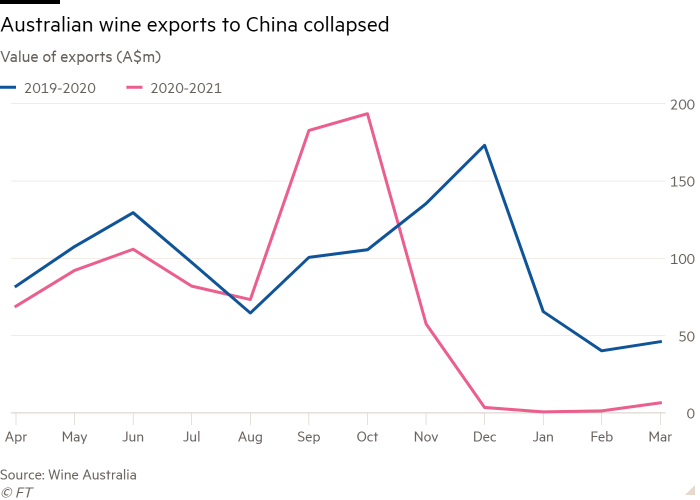
[ad_1]
Australia’s largest wine producer plans to significantly expand its business in China by using shipments from other markets to sidestep crushing tariffs Beijing has imposed on exports from the Pacific nation.
Accolade Wines, owner of the popular Hardys and Echo Falls brands, said it would ship wine from Chile and elsewhere to China, which would allow it to bypass tariffs of up to 218 per cent that were imposed in November after a rise in diplomatic tensions.
As a result, Australian wine exports to China sank 96 per cent year on year to just A$12m between December and March, according to data from Wine Australia, a government body.
The plan is part of efforts by Accolade which was bought by private equity group Carlyle for A$1bn (US$778m) in 2018, to expand beyond its core Australian and UK markets and sell more premium wines.
The company is also considering an initial public offering, with Hong Kong a potential venue.
“We think we can gain significant share in China,” said Robert Foye, Accolade’s chief executive, who admitted that the company has been slow to tap into China’s decade-long wine boom. “I just think [Accolade] didn’t have that global management team that really knew how to drive the business.”
Foye believes that China’s wine market could grow for another 15 years owing to low levels of per capita consumption and an expanding middle class.

Accolade, which generated A$1.2bn in turnover last year, is also aiming to boost sales in Asia, the US and other markets, Foye told the Financial Times.
Matthew Reeves, an analyst at research group IbisWorld, said smaller Australian producers had been hit hard by the tariffs, but the country’s biggest winemakers had been able to source products for the Chinese market from elsewhere.
“Accolade has private equity backing so it’s a viable strategy for them to import into China from other locations,” he said.
Foye, who built a successful China business as chief operating officer at rival Treasury Wine Estates before he was sacked for an unspecified breach of internal policies, said Accolade has compiled a list of acquisition targets. The company has brands in Chile, the US and South Africa and wants to add more premium wines suited to Chinese palates, such as reds with a fruity, sweeter taste, he said.
Accolade has bought two premium Australian wineries, Rolf Binder Wines and Katnook Estate, over the past year.
However, Foye admitted that the Chinese tariffs would slow its expansion, as most of its production was based in Australia.
Accolade aims to boost sales to markets outside of the EU and UK to 60 per cent of the group’s total within three years, up from about 40 per cent in 2021.
The winemaker made a loss of A$11.6m in the year to June 2020, accounts showed.
The business’s leverage peaked at nine times 2020 earnings before interest, tax, depreciation and amortisation, according to Moody’s Investors Service. The rating agency downgraded the parent of Accolade’s debt to B3 from B2, deeper into speculative grade, just over a year ago, citing higher than anticipated restructuring costs, production problems and the coronavirus pandemic.
Foye said the group forecast 25 per cent growth in earnings in the year to June and was considering a stock market listing.
“I want to do an IPO. And that is what we are going to do at Accolade Wines. So we are going to do that in the next two to three years either on the Australian Stock Exchange or actually I’d like to do it on the Hong Kong stock exchange.”
Trade Secrets

Trade Secrets is the FT’s must-read daily briefing on the changing face of international trade and globalisation.
Sign up here to understand which countries, companies and technologies are shaping the new global economy.
[ad_2]
Source link